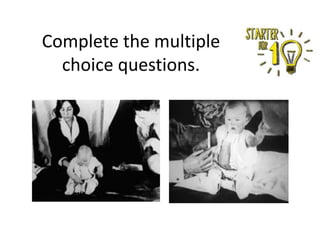
Week 3 Little Albert and Operant Conditioning Introduction
- 1. Complete the multiple choice questions.
- 3. Lesson Objectives By the end of the lesson you … • Must be able to evaluate (Ao2) the Little Albert study. • Should be able to evaluate (Ao2) the Little Albert study in relation to ethics. • Should be able to evaluate (Ao2) classical conditioning in relation to Little Albert. Page 26-29
- 4. BPS Ethical Concepts (1990) • Informed consent of participant • Right to withdraw • Debriefing • Deception • Observation • Protection of participants • Colleagues • Confidentiality • Competence When conducting research psychologists should adhere to these.
- 5. • C • D • C • D • W • P AN O AN’T O ITH ARTICIPANTS
- 6. • C • D • C • D • W • P ONSENT ECEPTION OMPETENCE EBRIEFING ITHDRAWAL ROTECTION
- 8. Describe The Learning Approach Describe Classical Conditioning Describe the Elements of CC Describe Aversion Therapy Evaluate Aversion Therapy Describe the Little Albert Study Evaluate the Little Albert Study
- 9. Review Tasks Using tasks /resources like: • Revision cards • Mindmaps • Read / Cover / Write • Story boarding • Past Exam Questions Consider : • Little Albert APRC • Little Albert Eval. • Classical Conditioning key terms • Aversion Therapy Eval. • Learning Approach assumptions.
- 11. • Must be able to evaluate (Ao2) the Little Albert study. • Should be able to evaluate (Ao2) the Little Albert study in relation to ethics. • Should be able to evaluate (Ao2) classical conditioning in relation to Little Albert.
- 12. Complete the worksheet following your flipped activity. Get page 16 ready for todays lesson.
- 13. Lesson Objectives By the end of the lesson you … • Must be able to describe (Ao1) what operant conditioning is and how it was discovered. • Must be able to identify (Ao1) elements of OC. • Should be able to apply (Ao2) operant conditioning to new situations to explain behaviours. Pg. 16-18
- 14. Approach Theories Studies Methods Learning Approach Classical Conditioning Aversion Therapy Operant Conditioning
- 15. Skinner
- 16. Food = reinforcer Shock = punishment
- 19. Conversion Task Describe how operant conditioning was discovered giving at least one example demonstrating how animals might learn a behaviour through operant conditioning. Pg. 16 / 5 minutes
- 20. Punishment Reinforcer Decrease chance of undesirable behaviour Increase chance of desirable behaviour Positive the addition of something / doing something. Negative the removal of something / stop doing something Adding something after an undesirable behaviour to decrease the chance of replication. E.g. Hitting a child after a bad behaviour Adding something after a desirable behaviour to increase the chance of replication. E.g. Reward of chocolate after good behaviour. Removing something after an undesirable behaviour to decrease the chance of replication. Eg. Taking a mobile off a child after bad behaviour. Removing something after a desirable behaviour to increase the chance of replication. Eg. Stop shouting at a child when they behave.
- 21. If you complete this then consider how you could create the same behaviour in a different way. Eg. If it is a PP how could you use a NP? Review Task For each of the 7 examples on your sheet: 1. State what type of punishment or reward it is an example of (PR,NR,PP, NP). 2. Describe WHY you have concluded this.
- 22. Conversion Task Define each of the following terms in relation to operant conditioning and give an example of each. – Reinforcer – Punishment – Positive Reinforcement – Negative Reinforcement – Positive Punishment – Negative Punishment Pg. 17-18 / 10 minutes
- 23. 1. You decide to clean up your mess in the kitchen in order to avoid getting in a fight with your roommate. 2. You wear your favourite baseball cap to class, but are reprimanded by your instructor for violating your school's dress code. 3. A teenage girl stays out for an hour past her curfew, so her parents ground her for a week. 4. At work, you exceed this month's sales quota so your boss gives you a bonus.
- 24. • Must be able to describe (Ao1) what operant conditioning is and how it was discovered. • Must be able to identify (Ao1) elements of OC. • Should be able to apply (Ao2) operant conditioning to new situations to explain behaviours.
